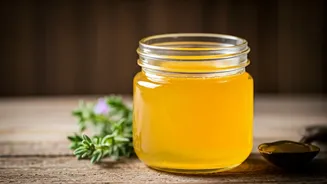Ghee: A Healthy Overview
Ghee, a type of clarified butter, has been a staple in Ayurvedic practices for centuries, valued for its nutritional properties and versatility in cooking.
Produced by simmering butter until the milk solids separate, ghee offers a rich, nutty flavor and a high smoke point, making it suitable for various culinary applications. Unlike butter, ghee is virtually lactose-free and casein-free, making it a good choice for people with dairy sensitivities. It is also a source of fat-soluble vitamins like A, D, E, and K, contributing to overall health. Furthermore, ghee is known for its ability to enhance the absorption of other nutrients and promote digestive health. Its unique composition makes it an excellent addition to a balanced diet, providing flavor and nutritional benefits.
Cooking with Ghee
The high smoke point of ghee makes it an excellent choice for high-heat cooking methods such as sautéing, frying, and roasting. Its rich, nutty flavor adds depth to dishes, enhancing their taste. When cooking with ghee, one can simply substitute it for other cooking oils or butter in recipes. It is especially suitable for Indian cuisine, where it is a key ingredient in many dishes, but it also works well in various international cuisines. Ghee's stability under high heat means it doesn't break down easily, making it a healthier option for cooking than some other oils. Additionally, the flavor of ghee complements a wide range of ingredients, adding a unique and delicious element to your meals. From breakfast to dinner, ghee can be used creatively in different recipes.
Benefits of Ghee
Ghee offers several health advantages. It's rich in vitamins A, D, E, and K, crucial for immune function, bone health, and skin vitality. These fat-soluble vitamins are easily absorbed by the body due to ghee's fat content. Additionally, ghee is a source of butyric acid, a short-chain fatty acid known for its anti-inflammatory effects and its ability to nourish the gut lining. Some studies suggest that ghee can help improve digestion, reduce inflammation, and support weight management. Moreover, ghee does not require refrigeration after opening, providing convenience for storage and use. The benefits of ghee contribute to overall health and well-being, making it a valuable addition to a mindful eating plan.
Selecting Ghee Products
When choosing ghee, consider factors like the source of the milk, the method of production, and any certifications available. Ghee made from grass-fed butter is often preferred, as it can be higher in beneficial nutrients such as omega-3 fatty acids and conjugated linoleic acid (CLA). Look for ghee that is made using traditional methods, which ensures purity and preserves the natural goodness. Certifications such as organic or non-GMO can guarantee the quality of the ghee. The flavor, aroma, and color of ghee can vary depending on its origin and processing. The color typically ranges from a pale yellow to a golden hue, and the aroma should be rich and nutty. Experimenting with different brands and types of ghee can help you find your preferred choice.














